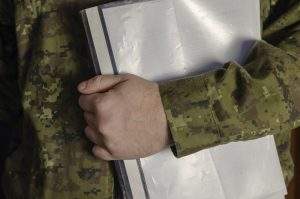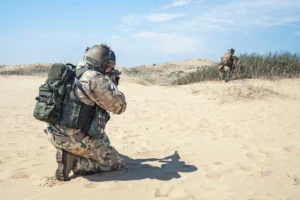FORT WALTON BEACH With World War II raging on, a 21-year-old Bob Carlson decided to join the military in 1942.
His father, a soldier, had served in the trenches during the war and witnessed his share of grisly combat. Carlson wasnt interested in that path.
He wanted to fly.
I liked flying, the now 93-year-old said recently from his home in Fort Walton Beach. I did not like the ground idea.
With that interest and a lot of hard work, Carlson graduated in the top 10 percent of his class at flight school. Soon, he found himself in Europe in the cockpit of a P-51, zooming down in the single-seat fighter over enemy lines, hoping he could be one to beat the odds and make it back home.
82 combat missions
After flight school, Carlson shipped off to war. He said good-bye to his family and his girl-friend and boarded a ship.
I didnt even know where I was going, so help me, Carlson recalled. All I knew is we were in a ship and going to North Africa.
Once he arrived there, Carlson was loaded into a box car, eventually making it to Italy.
It wasnt particularly fun traveling, but youre supposed to be tough enough to take it, so we were, he said.
He didnt get to actually fly his wartime plane, the P-51, until he got to his first overseas station.
He jumped at the chance, training on the job and learning to use the planes to scope for troop movement or weapons stashes and call in the bomber aircraft for attacks.
When I got there I told them, Ill fly anytime youve got somewhere to go, Carlson said.
Most of Carlsons missions, flown in Italy and Southern France, were over enemy lines. It made for harrowed flying they were shot at almost every time they took off the ground.
In addition to reconnaissance, the P-51 pilots also spotted for battleships to help them attack trains or other ground targets from the sea.
Occasionally, though they werent supposed to, the P-51 pilots did strafing missions, flying low to the ground to take out targets themselves, Carlson said.
Strafing wasnt part of the job, but we took it on anyway, he said. Wed go down and knock out a trains engine.
During one particular mission, Carlson spotted a caravan moving weapons and other materials across the country.
He led a group of fighter-bombers to the target through enemy territory. For his efforts, he was awarded the Distinguished Flying Cross.
On another mission, deep in enemy territory, Carlson noticed an enemy plane going after his flight commanders plane nearby.
He chased him down.
I was trying to shoot his engines out when I realized the rascal has a second man in his plane with a mounted machine gun and hes shooting out from the canopy, Carlson recalled. Well, I couldnt stand for that. He hit my 51 engine, if he got the radiator I wasnt going to make it home.
Carlson fired back.
I just shot the heck out of that plane, just blew it all apart, he said. He didnt shoot any-more after that.
Many P-51 pilots did not make it home.
They are shooting at you the whole time you are flying, Carlson said. Usually they miss. But sometimes they dont.
Beating the odds, Carlson made it through 82 combat missions without a scratch.
I got a few holes in my airplane, but nothing that stopped it, he said. I even crashed a few times and didnt get hurt. I dont even know how that could happen.
Homecoming
When Carlson was offered a chance to come home, he took it.
He was tired and felt lucky he had made it through as much as he did, and the fighting challenged his morals.
I didnt want to kill people, but in those days that wasnt said, he recalled.
He said when he could he would train his 50-caliber shots 100 yards off the target and watch the person bail out or dodge the fire. It disrupted their movement, but didnt directly take their life.
Hes doing his job for his people and Im doing my job for my people, he said. Ive got some scruples I dont like to pass over. I dont like to kill somebody who is doing their job, but I didnt dare say that then.”
The prospect of returning home was exciting for another reason he was hoping to reconcile with the girlfriend hed left behind.
Carlson had a girlfriend during flight school and after graduation went to visit her. When they met for dinner, she broke the news: Bob, Im married.
Though he tried to smile through it, the betrayal hurt him deeply.
Before shipping off to war, he began dating another woman, Johnnie.
I was hoping my girl would still be my girl when I got home, he said. She sure was.
The two wed soon after, spending over 60 years together until her death in 2007.
Carlson stayed in the military, serving in Korea and Vietnam, but his World War II experience re-mains pivotal to his career and his life.
Im glad I did what I did, he said. It all turned out good for me.”





